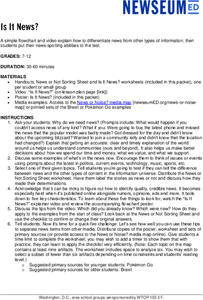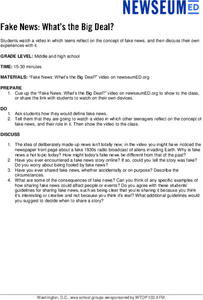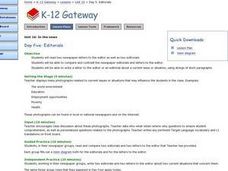Curated OER
Editing a Newspaper Article
Learners investigate article editing in today's society by writing their own news articles. In this journalism lesson, students create a word web based on the word "editing." Learners write their own news articles and peer edit them in...
Curated OER
Fighting Fake News
Fake news. Alternative facts. Internet trolls. In an age of Newspeak, it's increasingly important to equip 21st century learners with the skills needed to determine the legitimacy of claims put forth on social media, in print, and in...
Curated OER
Nellie Bly's Newspaper Club: Introducing the Science of Writing
Students evaluate a video about Nellie Bly, a famous reporter from the 19th century. They consider what makes a high-interest news article, write an essay in pairs and present it a literary tea.
Curated OER
Nellie Bly's Newspaper Club: Introducing the Art of Writing
Students use video and the Internet to research the life of Nellie Bly, a famous female reporter from the 19th century. They research a writer and present their information to the class in the style of a news reporter.
Curated OER
The Scoop Through Desktop Publication
Drafting, revising, and editing is all apart of the publishing process. Using a series of documents as inspiration, young journalists compose a class Newspaper. They work independently and in groups to publish their own articles.
Newseum
Front Page Photographs: Analyzing Editorial Choices
Frontpage photographs are the focus of four activities that ask young journalists to consider what the images reveal about a newspaper and its community. To begin, groups compare what images different papers from across the country use...
PBS
WWII: Detained
Imagine being forced against your will behind barbed wire for doing nothing but being yourself. Scholars investigate the impact Japanese-American internment camps had during World War II. Through video and archival evidence, they create...
Newseum
Civil Rights News Coverage: Looking Back at Bias
Not all southern newspapers covered the civil rights movement of the 1950s and 1960s. Young journalists investigate how The Lexington (Ky. Herald-Leader and The Jackson (Tenn.) Sun re-examined their coverage of the movement. After...
Curated OER
The Power of Fiction
Students explore fiction that moves individuals to social action. In this literature lesson, students read The Jungle by Upton Sinclair and analyze its literary worth as well as its investigative journalism. Students investigate other...
PBS
Decoding Media Bias
Alternative facts? After watching the We The Voters film, "MediOcracy," viewers compare how cable news outlets CNN, Fox News, and MSNBC report the same story about politics or public policy. After a whole-class discussion of their...
iCivics
Lesson 3: Bias
How do journalists balance bias and ethical reporting? The final lesson in a series of five from iCivics examines the different types of bias and how they affect the news we read. Young reporters take to the Internet to find examples of...
Newseum
Reporting Part III: Staying Objective
The third and final lesson in the Reporting series tests young journalists' ability to be objective in reporting contentious topics. After brainstorming a list of contentious topics that interest them, the class selects one, and...
Newseum
Is It News?
Is it news or not? That is the question young journalists must consider in a lesson about newsworthiness. Class members watch a short video that details five key characteristics of quality, credible news. Individuals then use these tips...
Facebook
Versions of Media Texts
Verification of provenance and the original source of an image or video can be a long and winding process. Young journalists learn about the difficulty of finding the original source of a scrape, a copy of an original news story, and...
Newseum
Fake News — What's the Big Deal?
In a time of fake news and alternative facts, young people must have the ability to identify it and its role. Scholars watch a video of teens reflecting on the concept of fake news and the impact of sharing fake news stories. They then...
Curated OER
The Brooklyn Museum of Art Newspaper
By working cooperatively, writers will create a newspaper about the Brooklyn Museum of Art. Each member will take on a different role representing various types of newspaper writers. They will discover the history, exhibits, special...
Curated OER
Editorials
Students investigate editorials. In this literacy critical thinking activity, students compare and contrast two newspaper editorials and two letters to the editor by completing a Venn diagram. Students work in groups to write authentic...
Curated OER
Blog Your Truth
Learners explore communication by participating in a digital journalism activity. In this aboriginal research instructional activity, students view a sample blog on the Internet and identify the techniques behind blogging and Internet...
Curated OER
How Safe is that Fresh Autumn Cider?
Corn stalks and pumpkins, caramel apples and cider, falling leaves and brisk nights. There are a few of autumn's favorite things. But how safe is that unpasteurized cider bought at the roadside stand? Young researchers investigate the...
Curated OER
For the Well-being of Our Citizens Lesson 2: Poverty And Human Rights
Students investigate the definitions of poverty and impoverishment. They design a poster that show the Articles of the Universal Declaration of Human Rights that are violated by poverty. They write an article for the school newspaper...
PBS
Historical Perspectives: Coming Home from War
What do the homecoming experiences of soldiers who fought in WWII, Vietnam, Iraq, and Afghanistan reveal about the politics and culture of the US during the time period of each war? Young historians view The Way We Get By, which tells...
PBS
Master of the Airwaves: How FDR Used Radio to Ease the Public’s Fears
The political and economic climate during the 1930's was uncertain and tumultuous. But Americans' minds and hearts were eased with the reassuring words of their president, Franklin D. Roosevelt, and addresses over the radio. High...
Curated OER
Evaluating Information on Food Labels
What kinds of foods include corn? Corn syrup? Start by viewing a clip of Food Inc. with your middle or high schoolers. Then, study a list of corn-derived ingredients, encouraging your class to see how many food products contain corn. A...
Curated OER
Parents And Alcohol: Who's To Blame
Students explore the topic of underage drinking. They find a focus and write a news feature/analysis that reports on what the community is doing to prevent underage drinking and some assessment of the extent of the problem.

























